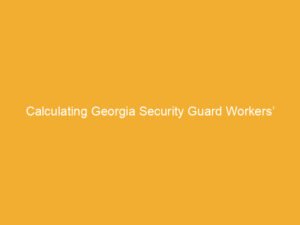
Retrospective Rating Plans for Large Security Guard Employers: Worth the Risk?
September 3, 2025
Return-to-Duty Fitness Tests: Reducing Workers’ Comp Severity in Nursing Homes
September 3, 2025In the security industry, managing workers’ compensation costs effectively is essential for maintaining operational efficiency and financial stability. For security companies operating in Georgia, understanding how workers’ comp rates are calculated can provide valuable insights into budgeting, risk management, and compliance. This article offers a comprehensive, step-by-step guide to calculating Georgia security guard workers’ compensation rates, enabling businesses to navigate the complexities of insurance premiums with confidence and precision.
Table of Contents
- Understanding Key Factors Influencing Georgia Security Guard Workers’ Compensation Rates
- Comprehensive Breakdown of the Calculation Process for Accurate Rate Estimation
- Strategies for Optimizing Workers’ Comp Costs Without Compromising Coverage
- Essential Recommendations for Maintaining Compliance and Risk Management in Georgia
- Q&A
- to sum up
Understanding Key Factors Influencing Georgia Security Guard Workers’ Compensation Rates
Several critical elements directly impact the determination of workers’ compensation rates for security guards in Georgia.Employer classification is foremost; companies are assigned a classification code based on job duties, with each code reflecting unique risk levels. Such as, armed security personnel generally face higher rates than those performing unarmed duties due to the increased potential for hazardous incidents. Additionally, an insurer will examine the company’s claims history, where a record of frequent or severe claims can elevate premium costs. Location also matters, as businesses operating in urban centers like Atlanta might encounter different risk factors compared to rural areas, influencing rate calculations.
Understanding these elements involves dissecting how each piece contributes to the overall premium. Consider these influencing factors:
- Payroll Size: Workers’ comp rates are frequently enough calculated as a percentage of the total payroll, so larger payrolls may lead to higher premiums but also often benefit from bulk rate considerations.
- Experience Modifier (EMR): This number reflects a company’s ancient loss experience compared to the industry standard; a lower EMR implies fewer claims and reduces rates.
- coverage Requirements: Policies tailored with additional coverage or lower deductibles will command different pricing than standard packages.
| Factor | Typical Impact | Example |
|---|---|---|
| Employer Classification | High/Medium/Low Risk | armed Guard: Higher rate |
| Experience Modifier | 0.75 - 1.25 scale | 0.85 = Premium Discount |
| Location | Risk variation by region | Urban vs. Rural |
Comprehensive Breakdown of the Calculation Process for Accurate Rate Estimation
To begin with, the accurate rate estimation for Georgia security guard workers’ compensation hinges on a detailed assessment of various risk factors tied to the industry. Workplace hazard classifications play a crucial role, as insurers categorize security jobs based on exposure to potential injuries and liabilities. Factors such as armed versus unarmed duties, frequency of patrols, and client environments are carefully examined. Additionally, payroll figures serve as a baseline multiplier-the higher the total payroll, the more premium the business likely incurs due to increased exposure. Another essential variable is the company’s claims history, which adjusts the base rate up or down: zero-claim histories often earn discounts, while multiple claims can lead to surcharges.
In terms of actual calculation,companies utilize a formula that integrates these elements systematically. The base rate, derived from the National Council on compensation Insurance (NCCI) classifications, is multiplied by the employer’s payroll (expressed in $100 increments) to determine an initial premium. this is then modified by experience modifiers, safety program credits, and state-specific adjustments.Below is a simplified example of the calculation structure:
| Component | Description | Value |
|---|---|---|
| Base Rate | Per $100 payroll,armed guard classification | $3.50 |
| Payroll | Total annual payroll | $200,000 |
| Experience Modifier | Claims history adjustment factor | 0.90 |
| Calculated Premium | (Base Rate x Payroll ÷ 100) x Experience Modifier | $6,300 |
By understanding each of these elements, businesses can better anticipate their workers’ comp costs, refine operational safety protocols, and negotiate with insurers more effectively, ensuring both compliance and cost-efficiency.
Strategies for Optimizing Workers’ Comp Costs Without Compromising Coverage
Effectively managing workers’ compensation costs in the security guard sector in Georgia requires a strategic approach that balances cost reduction with comprehensive coverage. One of the most prudent methods is to invest in robust risk management programs tailored specifically to the hazards security personnel face. This involves regular safety training, incident reporting protocols, and investment in protective equipment. Employers should also consider collaborating with safety consultants to identify workplace vulnerabilities, thus reducing the frequency and severity of claims.
Another key strategy is to leverage insurance policy customization by working closely with carriers to fine-tune coverage options and payment structures. By adjusting deductible levels, exploring dividend plans, and focusing on experience modification rates, companies can optimize premiums without lowering protection. Below is a simplified example illustrating how incremental safety improvements may impact the experience modification factor (EMR) and, consequently, the overall premium.
| Risk Management Level | Experience Modification Rate (EMR) | Estimated Annual Premium ($) |
|---|---|---|
| Baseline (No Program) | 1.20 | 18,000 |
| Moderate Safety Program | 1.00 | 15,000 |
| Advanced Safety Program | 0.85 | 12,750 |
Essential Recommendations for Maintaining compliance and Risk Management in Georgia
maintaining compliance and effectively managing risk are paramount for security guard companies operating in Georgia.Adhering to state-specific workers’ compensation laws not only prevents costly fines but also builds trust with employees and clients. Companies should regularly update their policies in line with Georgia’s guidelines, ensure accurate classification of job roles, and keep meticulous records of work-related incidents. Effective interaction and continuous training on safety protocols significantly reduce workplace injuries and claims, directly impacting the overall workers’ comp rates.
Along with policy adherence, implementing a proactive risk management strategy is essential. This includes conducting thorough risk assessments, enforcing safety standards on-site, and utilizing technology such as incident reporting software to track workplace hazards. Consider the following best practices to streamline compliance efforts:
- Regular compliance audits to identify potential gaps
- Employee safety training programs tailored to specific job risks
- Clear incident documentation to support accurate claims processing
- Collaboration with insurance brokers for optimal coverage reviews
| Risk Factor | Compliance Activity | Impact on Workers’ Comp Rate |
|---|---|---|
| Employee Training | Quarterly Safety Sessions | Reduces claims frequency by 20% |
| Incident Reporting | Real-time Digital Logs | Improves claims accuracy |
| Policy Review | annual Compliance Audits | Ensures regulatory adherence |
Q&A
Q&A: Calculating Georgia Security Guard Workers’ Comp Rates - Step-by-Step
Q1: Why is it vital for security guard companies in Georgia to accurately calculate workers’ comp rates?
A1: Accurately calculating workers’ compensation rates ensures compliance with state regulations, protects the business financially in case of employee injuries, and helps maintain competitive insurance premiums by reflecting the true risk profile of the workforce.
Q2: What are the primary factors that influence workers’ compensation rates for security guard companies in Georgia?
A2: Key factors include the company’s payroll volume, the National Council on Compensation Insurance (NCCI) classification code assigned to security guard jobs, experience modification factor (mod), state loss costs, and any applicable discounts or surcharges based on the company’s claim history.
Q3: What is the first step in calculating workers’ comp rates for Georgia security guards?
A3: The initial step is gathering accurate payroll data for all security guard employees. This payroll data forms the basis for rating, as rates are applied per $100 of payroll to determine premiums.
Q4: How does the classification code affect the rate calculation?
A4: Each job classification has an assigned NCCI code that reflects the risk level of the work performed. Security guards typically fall under a specific classification code with a predetermined base rate. This code directly affects the premium calculation sence rates vary by classification.
Q5: What role does the Experience Modification Factor (mod) play in the calculation?
A5: The Experience Modification Factor adjusts the base premium based on the company’s historic loss experience relative to it’s peers. A mod above 1.0 increases the premium, while a mod below 1.0 decreases it, incentivizing companies to maintain safe work environments.Q6: How is the base premium calculated?
A6: The base premium is determined by multiplying the total payroll (divided by 100) by the rate assigned to the security guard classification code. The formula is:
Base Premium = (Total Payroll / 100) × Classification Rate
Q7: What steps follow after calculating the base premium?
A7: After determining the base premium, multiply it by the Experience Modification Factor to adjust for claims history. Then add any state assessments or taxes required by Georgia law to arrive at the final premium.
Q8: Are there any common pitfalls companies should avoid when calculating these rates?
A8: Common pitfalls include misclassifying employees, underreporting payroll, not updating the mod factor annually, and overlooking state-specific surcharges. Such errors can lead to inaccurate premiums and potential non-compliance.
Q9: Can companies influence their workers’ comp rates?
A9: yes, companies can positively impact their rates by implementing strong safety programs, reducing workplace injuries, accurately classifying employees, and maintaining precise payroll records.These efforts help lower the Experience Modification Factor and overall premium costs.Q10: Where can Georgia security guard companies find resources or assistance to calculate workers’ comp rates properly?
A10: Companies can consult with licensed insurance brokers specializing in workers’ compensation, visit the Georgia State Board of Workers’ Compensation website, or utilize NCCI tools and resources to ensure accurate premium calculations.
this Q&A provides a structured overview for security guard companies in Georgia to understand and accurately calculate their workers’ compensation insurance rates,highlighting critical steps and considerations from a professional business perspective.
In Conclusion
accurately calculating Georgia security guard workers’ compensation rates is a critical component for risk management and financial planning within the industry. By understanding the specific classification codes, applying the correct experience modifiers, and factoring in additional payroll considerations, employers can ensure compliance while optimizing their compensation costs. Leveraging a methodical, step-by-step approach not only promotes transparency but also supports informed decision-making, ultimately safeguarding both the workforce and the organization’s bottom line. Staying informed about regulatory updates and industry best practices will further enhance the accuracy and efficiency of workers’ comp rate calculations in Georgia’s security sector.
“This content was generated with the assistance of artificial intelligence. While we strive for accuracy, AI-generated content may not always reflect the most current information or professional advice. Users are encouraged to independently verify critical information and, where appropriate, consult with qualified professionals, lawyers, state statutes and regulations & NCCI rules & manuals before making decisions based on this content.

